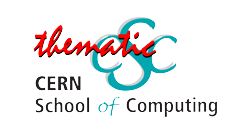| Technologies & Platforms |
- Introduction to Efficient Computing
- The evolution of computing hardware and what it means in practice
- The seven dimensions of performance
- Controlling and benchmarking your computer and software
- Software that scales with the hardware
- Advanced performance tuning in hardware
- Intermediate Concepts in Efficient Computing
- Memory architectures, hardware caching and NUMA
- Scaling out: Big Data – Big Hardware
- The role of compilers and VMs
- A brief look at accelerators and heterogeneity
- Data Oriented Design
- Hardware vectorization in detail – theory vs. practice
- Software design for vectorization and smooth data flow
- How can compilers and other tools help?
- Summary and Future Technologies Overview
- Teaching program summary and wrap-up
- Next-generation memory technologies and interconnect
- Rack-sized datacenters and future computing evolution
- Software technologies – forecasts
|
| Programming for concurrency and correctness |
- Scientific programming in C++: a modern approach
- Introduction: Amdahl's law, Performance and correctness of codebases
- A modern C++: new constructs, their advantages
- Gain runtime leaning on modern compilers
- Understanding the differences and commonalities of data structures, metrics for their classification, concrete examples
- Expressing Parallelism Pragmatically
- Trivial asynchronous execution
- Task and data decomposition
- Threads and the thread pool model
- In depth comparison of threads and processes, guidelines to choose the best option
- Message passing approach and analogies with object orientation
- Protection of Resources and Thread Safety
- The problem of synchronization
- Useful design principles
- Replication, atomics, transactions and locks
- Lock-free programming techniques
- Functional programming style and elements of map-reduce
- Third party libraries and high level solutions
- Ensure Correctness of a Parallel Scientific Application
- Correctness and reproducibility of a scientific result
- Stability of results and testing: regression, physics performance, tradeoffs
- Enforce avoiding thread unsafe constructs: focus on static analysis
- Algorithms for detecting synchronisation pathologies: focus on the DRD and Helgrind tools
- Elements of the GNU debugger: introduction and specific usage in the multithreaded case
|
| Effective I/O for Scientific Applications |
- Structuring data for efficient I/O
- Pro/cons of row-column and mixed formats
- Compression and its efficiency dependencies on variable types, impact of data format
- Data addressing : limitation of hierarchical approach, usage of flat namespaces
- Stateful vs stateless interfaces for namespaces and I/O
- Many ways to store data
- Storage devices and their specificities
- Data federation
- Parallelizing files storage
- Map/Reduce
- Preserving Data
- Risks of data loss and corruption
- Data consistency (checksumming)
- Data safety (redundancy, parity, erasure coding)
- Key Ingredients to achieve effective I/O
- Asynchronous I/O
- I/O optimizations
- Caching
- Influence of data structures on I/O efficiency
|
